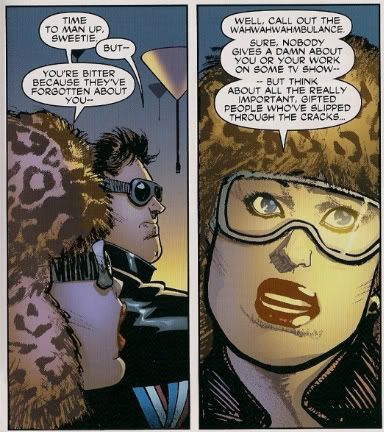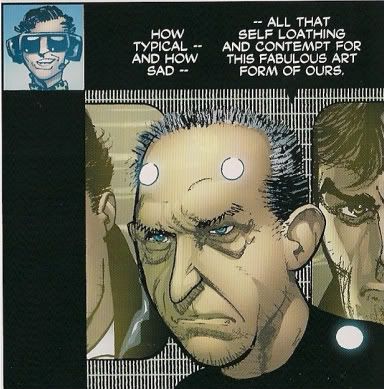Missing
*Yeah, I made a mistake last Monday, no getting around it. In the mess of IDW releases hitting stores, some of which I've been waiting on for months, I totally forgot their release of Hero Comics, a $3.99 benefit book for The Hero Initiative that boasts a rare and exciting sight indeed: an all-new five-page American Flagg! story by Howard Chaykin and frequent colorist Edgar Delgado. Arriving the same week as Chaykin's revived Dominic Fortune at Marvel, no less!
I'll be getting into Fortune later this weekend (spoiler: I liked it), although folks eager for discussion are commended to Professor Fury's fine recent spread of Howard Chaykin posting, covering many topics from all over the artist's personal timeline. But for now I just want to draw some attention to that new Flagg! piece, which stands apart from the expected benefit book testimonials and metaphors and politicking as an interesting piece of introspection on the part of the artist, taking his use of an old, beloved character as an opportunity to assess his legacy, or at least his feelings on the idea of one.

Put briefly, the story sees Reuben Flagg enjoying a lively discussion of Chicago political corruption when he's accosted by a remote talk show broadcast hellbent on discovering whatever happened to the once-popular star of Mark Thrust, whose career has doubtlessly gone to hell. In contrast, Thrust is still going strong, apparently from the efforts of two-time Give 'Em What They Want Award-winning executive producer Mallory Sands. Flagg dismisses the show as "silly junk," prompting a good dressing down from Sands on the beauty and uniqueness of the medium, even though it still looks to Flagg like "a retread of something I did in season one."
It's a cute piece, but prickly too, positioning Flagg's work in television as a metaphor for Chaykin's work in comics (while amusingly playing off Chaykin's own days in the tv field), and thereby evidencing a certain self-defensive irreverence toward the idea of legacy or importance in this hard-hitting genre works. Mr. Sands, meanwhile, playfully lampoons a certain vocal, popular artist of Chaykin's generation, clad in a motion capture suit and stalking around alone on an empty virtual set, tee hee. And oh how he's aged, while Flagg remains young!

That's not a direct quote (at least not one I'm aware of), but an evocation of some familiar Frank Miller rhetoric. Take this selection from Eisner/Miller, p. 168:
"The sickness is self-contempt. I am the young puppy of a certain generation that started becoming a force in comics in the seventies and eighties, but I still see the industry of comics hobbled by this sense of worthlessness that thinks of the medium as a genre that'll be shaken off over time. It still amazes me how deep-rooted that is."
Chaykin teases at the disconnect between these sentiments and the man's work on a show about a guy who fights crime above the belt and screw around below it, "frequently at the same time," taking the property back to its dark and edgy roots, which is really a bit of a canard at this point - the joke is that Sands is taking things too seriously, even though the recent likes of All Star Batman and Robin, the Boy Wonder have abandoned heavy-handed grit for a type of manic, brutal hi-jinx that actually does neatly evoke the off-balance nature of early superheroes, at least as presented in books like Greg Sadowski's Supermen!
But then, it's not so much a one-to-one Miller-to-Sands comparison anyway, as a general weariness with the corporate pop comics game; Chaykin is a player, as a prolific visualist, but it's telling that his writer/artist works have been restricted to his own creations or the usage of superhero characters (Captain America, Guy Gardner) as political beings. And that's still not the whole point: Flagg may complain, but that image up top makes clear that he's more passive-aggressive about being remembered for his work than anything perfectly flippant.
An endearing bit of autobiography, that, yet well-suited to this benefit for cartoonists in need. For every anxious-yet-successful Reuben Flagg, there's plenty more innovative, powerful talents who got much less, by more immediate means than the evaporation of acknowledged influence. These debates are small, in the end, compared to the good that can be done - and if we're gonna ponder this stuff, we might as well raise some money in the process. Not a bad deal; glad I caught on eventually.
I'll be getting into Fortune later this weekend (spoiler: I liked it), although folks eager for discussion are commended to Professor Fury's fine recent spread of Howard Chaykin posting, covering many topics from all over the artist's personal timeline. But for now I just want to draw some attention to that new Flagg! piece, which stands apart from the expected benefit book testimonials and metaphors and politicking as an interesting piece of introspection on the part of the artist, taking his use of an old, beloved character as an opportunity to assess his legacy, or at least his feelings on the idea of one.

Put briefly, the story sees Reuben Flagg enjoying a lively discussion of Chicago political corruption when he's accosted by a remote talk show broadcast hellbent on discovering whatever happened to the once-popular star of Mark Thrust, whose career has doubtlessly gone to hell. In contrast, Thrust is still going strong, apparently from the efforts of two-time Give 'Em What They Want Award-winning executive producer Mallory Sands. Flagg dismisses the show as "silly junk," prompting a good dressing down from Sands on the beauty and uniqueness of the medium, even though it still looks to Flagg like "a retread of something I did in season one."
It's a cute piece, but prickly too, positioning Flagg's work in television as a metaphor for Chaykin's work in comics (while amusingly playing off Chaykin's own days in the tv field), and thereby evidencing a certain self-defensive irreverence toward the idea of legacy or importance in this hard-hitting genre works. Mr. Sands, meanwhile, playfully lampoons a certain vocal, popular artist of Chaykin's generation, clad in a motion capture suit and stalking around alone on an empty virtual set, tee hee. And oh how he's aged, while Flagg remains young!

That's not a direct quote (at least not one I'm aware of), but an evocation of some familiar Frank Miller rhetoric. Take this selection from Eisner/Miller, p. 168:
"The sickness is self-contempt. I am the young puppy of a certain generation that started becoming a force in comics in the seventies and eighties, but I still see the industry of comics hobbled by this sense of worthlessness that thinks of the medium as a genre that'll be shaken off over time. It still amazes me how deep-rooted that is."
Chaykin teases at the disconnect between these sentiments and the man's work on a show about a guy who fights crime above the belt and screw around below it, "frequently at the same time," taking the property back to its dark and edgy roots, which is really a bit of a canard at this point - the joke is that Sands is taking things too seriously, even though the recent likes of All Star Batman and Robin, the Boy Wonder have abandoned heavy-handed grit for a type of manic, brutal hi-jinx that actually does neatly evoke the off-balance nature of early superheroes, at least as presented in books like Greg Sadowski's Supermen!
But then, it's not so much a one-to-one Miller-to-Sands comparison anyway, as a general weariness with the corporate pop comics game; Chaykin is a player, as a prolific visualist, but it's telling that his writer/artist works have been restricted to his own creations or the usage of superhero characters (Captain America, Guy Gardner) as political beings. And that's still not the whole point: Flagg may complain, but that image up top makes clear that he's more passive-aggressive about being remembered for his work than anything perfectly flippant.
An endearing bit of autobiography, that, yet well-suited to this benefit for cartoonists in need. For every anxious-yet-successful Reuben Flagg, there's plenty more innovative, powerful talents who got much less, by more immediate means than the evaporation of acknowledged influence. These debates are small, in the end, compared to the good that can be done - and if we're gonna ponder this stuff, we might as well raise some money in the process. Not a bad deal; glad I caught on eventually.

<< Home